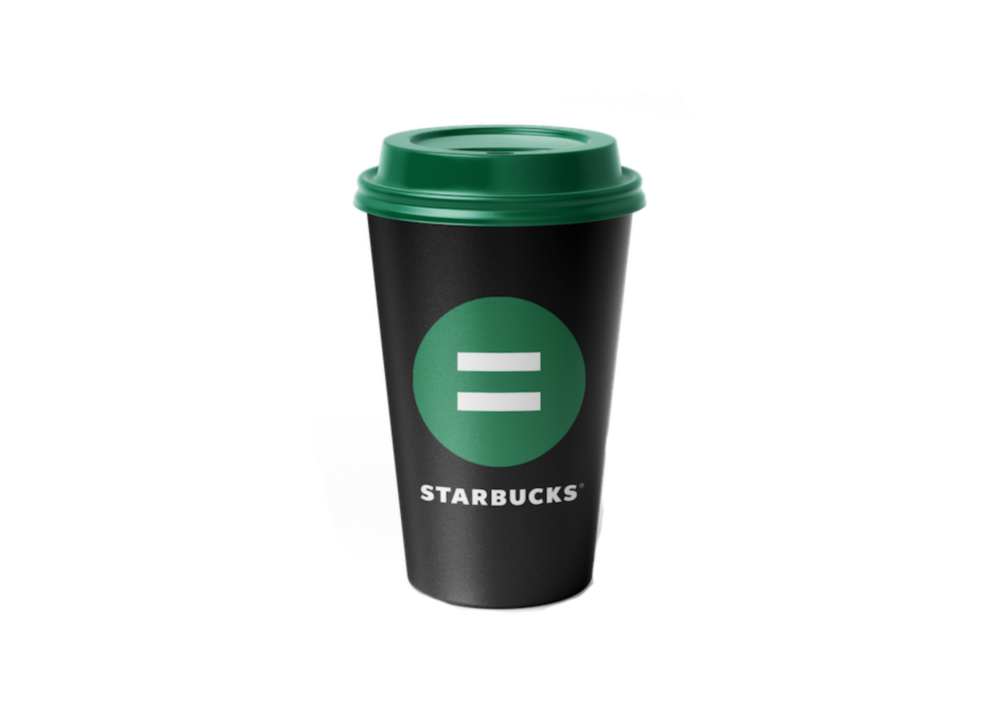
“Starbucks’s plant-based-milk upcharge is an unfair and racially targeted overcharge,” said physician and expert in racial bias in nutrition
Switch4Good—a nonprofit dedicated to educating about the benefits of going dairy-free—together with the Yes Men, experts at exposing corporate wrongs, today mounted an elaborate “brandjacking” campaign against Starbucks, calling out the coffee giant for dietary racism.
Thursday morning, a convincing spoof site, StarbucksCares.com, and video announced that Starbucks would drop its upcharge on plant-based milks, and instead raise prices of dairy-based drinks. The initiative was launched with a magnificent new themed cup—the Justice Cup—a corporate social responsibility masterpiece that allows consumers to proudly, and vapidly, show their concern for racial equity.
The spoof immediately grabbed headlines from news outlets like Business Insider and the Daily Caller, among others.
The “initiative” reflected the fact that 65% of the world’s population cannot digest dairy—a condition known as lactose intolerance, which disproportionately affects Black, Indigenous and People of Color communities, as a fake spokesperson with the title “Starbucks equality innovations director” explained.
However, Starbucks was quick to deny it was doing the right thing, and said the company has “known about ethnicity-related lactose intolerance for many years.”
“We assure our most valued customers that we would never place the burden of a dairy upcharge on them,” the company told Yahoo! News. “We categorically deny the accusations of ‘dietary racism’ in this false announcement. Starbucks is and always has been a vigorous defender and promoter of people of all the colors.”
Cue the record scratch…wait, what? “People of all the colors?” Did Starbucks really say that?
As it turns out, it didn’t. That, too, was part of Switch4Good’s spoof.
The absurd Starbucks denial was part of Switch4Good’s campaign to highlight the dietary racism of plant-based upcharges. The facts are completely real: lactose intolerance disproportionately affects communities of color—95% of Asians, up to 80% of Black and Latinx people, and more than 80% of Indigenous Americans cannot digest dairy, versus only 15% of white people.
“While sadly it isn’t true that Starbucks is changing its policy, what is true is that profiting off of people of color who are only trying to maintain their health is systemic racism,” said Milton Mills, MD, an urgent care physician in Washington DC who has published several research journal articles addressing racial bias in federal nutrition policy. “By the numbers, more people of color are forced to pay extra, which makes it not just an upcharge but an unfair and racially targeted overcharge.”
Switch4Good advocates dropping dairy not only for health but also for environmental reasons. Starbucks—the real Starbucks—openly acknowledges that dairy products are the single biggest source of carbon dioxide emissions across its operations and supply chain, and the second highest contributor to water withdrawal.
“Starbucks has ignored our efforts to encourage them to right this injustice, so we had to resort to another way to communicate this important issue,” said Switch4Good executive director Dotsie Bausch. “When people choose plant-based milk, they’re doing something for their health, for the responsibility we all have to our planet and they are standing up for justice for all beings. These reasons should always be more important than a corporate bottom line.”
Switch4Good has a history of advocacy for food justice. It has petitioned the USDA to remove dairy from the Dietary Guidelines for Americans (DGA), and testified on Capitol Hill. It succeeded, alongside other NGOs, in getting soy milk recognized as nutritionally equivalent to dairy in the DGA, and is currently working to ensure schools have access to, and reimbursement for, soy milk. Its multidisciplinary and multicultural coalition that includes BIPOC clinicians, dietitians, activists, athletes, and other thought leaders, works to pressure lawmakers into enacting fairer, healthier nutrition policy.


I love Starbucks but I hate their slow adaption to the plant based movement, I’m glad to see them being called out in clever ways that generate conversations. It’s obscene how much extra a plant based milk costs and they don’t even offer full equivalence in their drinks such as a plant based whip cream. There’s no excuse for it.